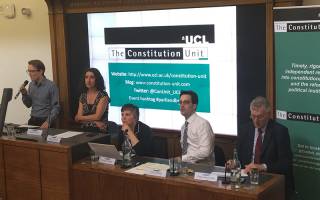7 April 2022 - We explore the key arguments around how the role of members affects the kind of leaders and policies adopted, balanced with the role of MPs.
If Boris Johnson leaves office before the next general election, Conservative Party members will have a decisive say in who replaces him as party leader and Prime Minister. This prospect raises the wider question of what role ordinary members should play in party leadership elections. The UK has seen extensive variation in the role of ordinary grassroots members, as compared to MPs, in leadership contests – both between the different parties, and over time. This has previously led to some controversies, most obviously around the election (and re-election in 2016) of Jeremy Corbyn as Labour leader. What consequences does the role of members have for the kinds of leaders and policies that parties adopt? How should this be balanced with the role of MPs? This seminar will explore the key arguments.
Speakers:
Paul Goodman, Editor of Conservative Home and former Conservative MP for Wycombe
Cat Smith MP, Labour Member of Parliament for Lancaster and Fleetwood
Dr Tom Quinn, Senior Lecturer, Department of Government, University of Essex
Chair: Professor Meg Russell, Director of the Constitution Unit.
Useful links:
- Conservative Party members should have no say in the election of its next leader by David Gauke
- Why a central role for party members in leadership elections is bad for parliamentary democracy by Meg Russell
- The Conservative Party's Leadership Election of 2016: Choosing a Leader in Government by Tom Quinn
 Close
Close




